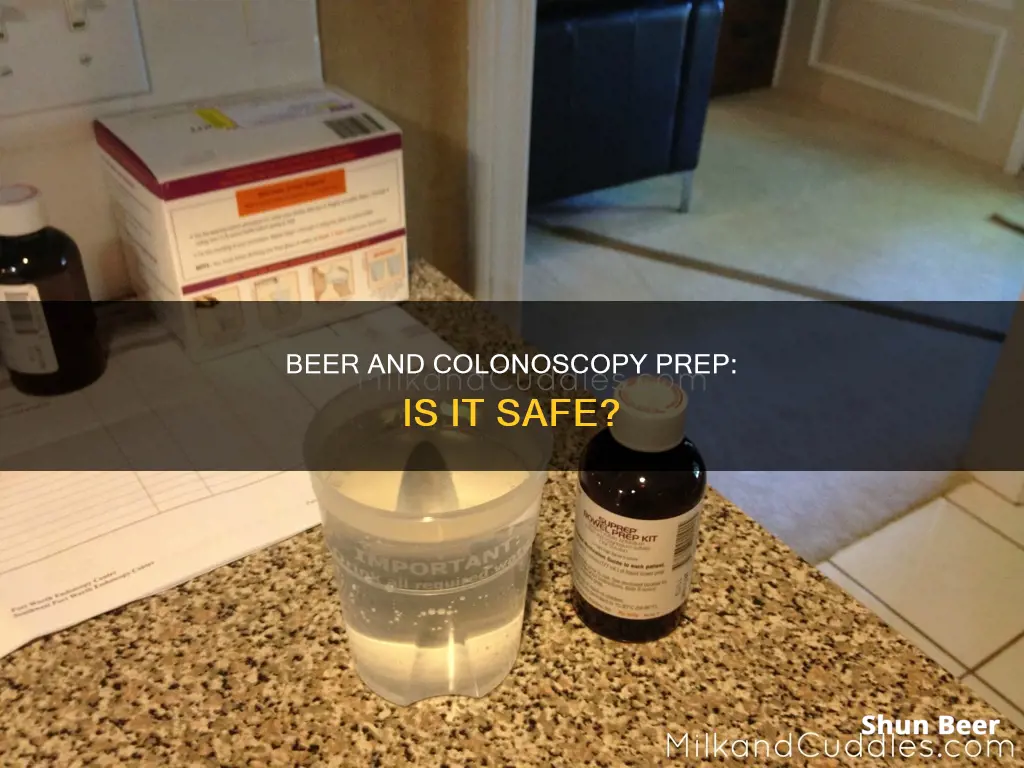
Drinking beer or other alcoholic beverages is not recommended during the preparation for a colonoscopy. Alcoholic drinks can cause dehydration, as they can lead to a loss of fluids, and they may also interfere with the sedatives used during the procedure. Alcohol can also cloud your judgement, which is important to avoid when following prep instructions. In addition, red, blue, and purple drinks, such as red wine, can leave residue and stain the colon, interfering with the accuracy of the test. Therefore, it is best to avoid drinking beer or any other alcoholic beverage before a colonoscopy and opt for clear liquids such as water, sports drinks, tea or coffee without milk or cream, and clear sodas.
| Characteristics | Values |
|---|---|
| Should you drink beer while prepping for a colonoscopy? | No |
| Why can't you drink beer before a colonoscopy? | Beer can lead to dehydration and interfere with a doctor's interpretation of your colon health. It may also interact with sedatives used during the procedure. |
What You'll Learn

Beer interferes with the doctor's interpretation of your colon health
Drinking beer or any other alcoholic beverage before a colonoscopy is not recommended as it can interfere with a doctor's interpretation of your colon health in several ways. Firstly, alcohol is dehydrating, and dehydration can cause unpleasant side effects such as mood changes like irritability. As you will already be losing a lot of fluids from your pre-colonoscopy laxative cleanse, adding to this dehydration will only increase the likelihood of experiencing these side effects.
Secondly, alcohol may interact with the sedatives used during the procedure. According to the Iowa Clinic, drinking alcohol may mean you need a higher dose of anesthesia. Colonoscopy sedatives can also remain in your system, so it is advised to wait to drink alcohol until at least one full day after your procedure, as per the advice of Kaiser Permanente.
Additionally, alcohol can interfere with certain medications you may be taking, leading to side effects or altering how well your medicine works. Common types of medications that do not mix well with alcohol include anxiety and depression medication, high blood pressure medication, high cholesterol medication, and anti-seizure medication.
Lastly, alcohol can cloud your judgment and alter your thought process, which is important to avoid during the colonoscopy process. Being sober will help ensure you properly follow prep instructions and have a clear mind to communicate with your doctor and understand your results.
Therefore, it is crucial to refrain from drinking beer or any alcoholic beverage before a colonoscopy to ensure an accurate interpretation of your colon health and a safe and successful procedure.
Beer and Pristiq: What You Need to Know
You may want to see also

Alcohol may interact with the sedatives used during the procedure
Alcohol should be avoided before a colonoscopy as it may interact with the sedatives used during the procedure. This means that drinking alcohol may result in a higher dose of anaesthesia being required. Colonoscopy sedatives can also remain in your system for some time after the procedure, so it is recommended to wait at least a full day after the procedure before consuming alcohol.
Alcohol can also interfere with the effectiveness of certain medications, including anxiety and depression medication, high blood pressure medication, high cholesterol medication, and anti-seizure medication. This can lead to side effects or alter how well your medicine works, which can impact the effectiveness of the colonoscopy prep, the procedure itself, or your overall health.
In addition, alcohol is dehydrating, and dehydration can cause unpleasant side effects such as mood changes and irritability. As the pre-colonoscopy laxative cleanse already results in a significant loss of fluids, consuming alcohol can further exacerbate dehydration.
Drinking Beer in Space: What's the Deal?
You may want to see also

Beer can lead to dehydration
Alcohol is a diuretic, which means it causes your body to remove fluids from your blood through your renal system (the kidneys, ureters, and bladder) at a much quicker rate than other liquids. This can lead to dehydration, especially if you don't drink enough water with your beer.
The diuretic effect of alcohol is caused by its suppression of the antidiuretic hormone vasopressin, which normally causes the body to hold onto water. When you drink alcohol, the level of vasopressin in your body decreases, leading to increased urine output.
In addition, the water in beer is flushed out of the body much faster than alcohol is processed, which can increase your blood alcohol concentration (BAC) if you don't drink water to replenish your body's fluid supply.
Therefore, it is important to avoid beer and other alcoholic beverages before a colonoscopy and to drink plenty of water or other hydrating fluids to ensure you are properly hydrated for the procedure.
Drinking Beer on Kauai Beaches: What's Allowed?
You may want to see also

Alcohol may interact with certain medications
According to the National Institute on Alcohol Abuse and Alcoholism, alcohol can interfere with certain medications, leading to side effects or altering how well the medicine works. This can get in the way of effective colonoscopy prep, a successful procedure, or your overall health.
Some common types of medications that do not mix well with alcohol include:
- Anxiety and depression medication
- High blood pressure medication
- High cholesterol medication
- Anti-seizure medication
It is important to discuss your alcohol consumption with your doctor before a colonoscopy to ensure that it will not interfere with any medications you are taking.
Beer and Painkillers: How Does Ibu Work?
You may want to see also

Alcohol can alter your thought process
Drinking alcohol before a colonoscopy is not recommended. While it may seem like a good way to calm your nerves, it can lead to dehydration, as the procedure involves a laxative cleanse, which already causes a significant loss of fluids. Dehydration can cause various unpleasant side effects, including mood changes and irritability.
Additionally, alcohol may interact with the sedatives used during the procedure. It may increase the required dosage of anesthesia and can linger in your system, so it is advisable to refrain from drinking alcohol until at least a full day after the colonoscopy.
Another crucial reason to avoid alcohol before a colonoscopy is its ability to alter your thought process and cloud your judgment. Staying sober is essential to ensure you follow the prep instructions correctly and maintain a clear mind to communicate effectively with your doctor and understand your results.
Furthermore, alcohol can leave residue in your colon, interfering with the accuracy of the test. Staining from red, blue, and purple drinks, such as red wine, can resemble blood and hinder the doctor's ability to detect any issues.
In summary, while it may be tempting to reach for an alcoholic beverage to ease pre-colonoscopy jitters, it is crucial to abstain for your health, safety, and the accuracy of the procedure.
Alcohol has the ability to influence your thoughts, feelings, and behaviours. It can alter your thought process and cloud your judgment in several ways:
- Disrupting brain chemicals: Alcohol interferes with the natural functioning of your brain by disrupting brain chemicals, such as gamma-aminobutyric acid and dopamine. This disruption can lead to changes in your mood, cognition, and judgment.
- Impairing cognitive functions: Alcohol is a central nervous system (CNS) depressant, which means it impairs your ability to perform cognitive functions effectively. This includes forming memories, making decisions, and regulating emotions or urges.
- Lowering inhibitions: Alcohol reduces your inhibitions, making it easier to act on impulses and removing the filters and defence mechanisms you typically employ in daily life. This can lead to saying or doing things you might not otherwise do when sober.
- Magnifying underlying feelings: Alcohol can amplify your underlying feelings or tendencies, making them more pronounced. This includes emotions such as stress, anxiety, or anger, which may be intensified under the influence of alcohol.
- Altering personality traits: Alcohol can affect your personality traits, making you seem like a different person to yourself and others. While these changes may be temporary for some, heavy and chronic alcohol consumption can lead to long-lasting personality shifts.
- Influencing mental health: Alcohol has a strong connection with mental health. It can worsen existing mental health conditions and increase the risk of developing new ones. Alcohol can negatively impact your mental state, leading to depression, anxiety, psychotic symptoms, and antisocial behaviours.
It is important to note that the effects of alcohol on your thought process and behaviour can vary from person to person. However, it is always advisable to consume alcohol responsibly and be mindful of how it may impact your thoughts, actions, and overall well-being.
Does Your Growler Still Offer Fresh Beer?
You may want to see also
Frequently asked questions
No, you should not drink beer or any other alcoholic beverage while prepping for a colonoscopy. Alcoholic drinks can cause dehydration and may interfere with the sedatives used during the procedure.
You can drink clear liquids such as water, fruit-flavoured beverages, carbonated drinks, tea or coffee with a small splash of milk, sports drinks, and clear broth.
Beer is not recommended before a colonoscopy because it can cause dehydration and may interfere with the sedatives used during the procedure. Alcohol can also cloud your judgement and leave residue in your colon, affecting the accuracy of the test.







